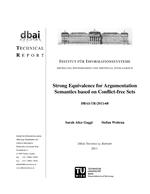Strong Equivalence for Argumentation Semantics based on Conflict-free Sets
Aus International Center for Computational Logic
Strong Equivalence for Argumentation Semantics based on Conflict-free Sets
Sarah Alice GagglSarah Alice Gaggl, Stefan WoltranStefan Woltran
Sarah Alice Gaggl, Stefan Woltran
Strong Equivalence for Argumentation Semantics based on Conflict-free Sets
Technical Report, Technische Universität Wien, volume DBAI-TR-2011-68, 2011
Strong Equivalence for Argumentation Semantics based on Conflict-free Sets
Technical Report, Technische Universität Wien, volume DBAI-TR-2011-68, 2011
- KurzfassungAbstract
Argumentation can be understood as a dynamic reasoning process, i.e. it is in particular useful to know the effects additional information causes with respect to a certain semantics. Accordingly, one can identify the information which does not contribute to the results no matter which changes are performed. In other words, we are interested in the so-called kernel of a framework, where two frameworks with the same kernel under a certain semantics are then ”immune” to all kind of newly added information and still produce the same outcome. The concept of strong equivalence for argumentation frameworks captures this intuition and has been analyzed for several semantics which are all admissible based. Other important semantics have been neglected so far. To close this gap, we give strong equivalence results with respect to naive, stage and cf2 extensions, and we compare the new results with the already existing ones. Furthermore, we analyze strong equivalence for symmetric frameworks and discuss local equivalence, a certain relaxation of strong equivalence. - Forschungsgruppe:Research Group: Computational LogicComputational Logic, Logische Programmierung und ArgumentationLogic Programming and Argumentation
@techreport{GW2011,
author = {Sarah Alice Gaggl and Stefan Woltran},
title = {Strong Equivalence for Argumentation Semantics based on
Conflict-free Sets},
institution = {Technische Universit{\"{a}}t Wien},
year = {2011}
}
